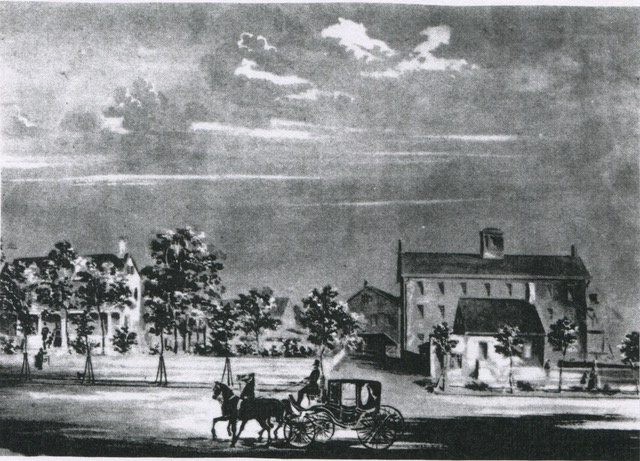
Part I Responding to the Call to Arms
Submitted by Al Shipley, City Historian
and Rahway Library Research Consultant
The assault on Fort Sumter took place 160 years ago on April 12, 1861, marking the beginning of four long years of terrible strife for our relatively new nation. When word reached the cities and towns in both North and South, it was met with the premature excitement that greets too many wars. Politicians rose to the occasion and gave patriotic speeches, shopkeepers closed their doors as if for a holiday, and young men rushed to organize and enlist “before the war was over.”
The young men of Rahway couldn’t wait to get into the action and after President Lincoln’s call to arms on May 4, 1861 for 75,000 United States volunteers, the War Department directed New Jersey to form three infantry regiments. A local man, James Bodwell, was the first to sign up. New Jersey’s initial volunteer infantries, which included seventy-two men from Rahway, were mustered into the Union Army on May 21. A year later, thirty-two more would join and by the close of the war 535 men from the city, almost one-tenth of Rahway’s population, would participate in the deadly conflict.
Prior to Lincoln’s May 4th call, one group of Rahway men had secured a brass Napoleon cannon and were intent on forming an artillery unit. They sought out an experienced leader and approached John R. Chapin, who had been a captain of an artillery battery in Newark, to guide them in their efforts. Chapin accepted their appeal and went to the Irving Street carriage factory owned by Isaac Osborn to ask him if the boys could meet and store their equipment in the basement of his warehouse. Osborn consented and a meeting was set for the end of the week.
Almost seventy-five young men between the ages of sixteen and twenty-two arrived at Osborn’s and although the boys wanted to hurry off to the front, Chapin explained that a period of training was essential. Newspaper accounts recorded that “The boys were drilled in their marchings and facings and the residents of Rahway witnessed squads of ununiformed boys who raised the dust in the streets at night, and to whom it seemed very much like playing soldiers.” It would be almost a month and a half before equipment arrived and the delay caused many of the young soldiers to lose interest. To them, there didn’t seem to be much fun in marching through the streets without uniforms or weapons.
While the monotonous and unglamorous drilling proceeded, Chapin applied to Trenton offering the unit and their cannon to the war effort. The state officials, however, turned down their request because New Jersey at that time was not enlisting the services of cavalry or artillery units. (The state would raise additional regiments throughout the war and would eventually accept cavalry and artillery units). The disappointment felt after receiving this news was quickly alleviated when a dispatch arrived from New York asking them to join ranks with the Ninth Regiment of that state. The offer was accepted, and Company K of the Ninth New York State Militia was formed under the command of Lieutenant Walter M. Bramhall, a well-respected figure in the city.
Six days before the newly designated company’s departure, school children conducted a flag-raising ceremony at the Second Ward schoolhouse on Union Street. A large American flag, prepared by teachers and students, was raised on the school’s flagstaff. Following speeches given by prominent ministers, all joined in singing patriotic songs.
On Sunday, June 9, 1861, Company K, now composed of thirty-nine men, marched to the First Baptist Church located on Milton Avenue opposite Fulton Street. Every seat in the church was occupied and those who couldn’t get in listened at the door. Reverend William Rollinson delivered an eloquent sermon (Luke VIII:5 “For He Loveth Our Nation”) and closed by advising the boys to be wary of the demoralizing influences of camp life.
When the sermon was completed, the company marched up Milton Avenue to Fourth Street (Esterbrook Avenue) and came to attention at the home of Commander Chapin. He presented a speech in which he told the boys of the sadness of battle, the honor of serving, and the righteousness of the cause. He also warned them to mind their conduct and to beware of liquor and profanities. He then presented Bibles, which had been donated by a lady of the city, to each soldier to “carry and peruse.” Chapin then turned the company over to Lieutenant Bramhall.
Company K left Rahway on Thursday, June 13 on the 11:20 train. Members of volunteer fire companies and a great many flag-waving citizens escorted the soldiers to the station. Each had been furnished with a knapsack, a haversack, a canteen, woolen and water-proof blankets, belts, and a mess kit. The Daughters of Liberty had supplied havelocks, undershirts, and drawers. Leaving peace, security, and youth behind, they were about to be thrust into the great abyss of war.
Next issue: Part II – Rahway Boys Go into Battle

